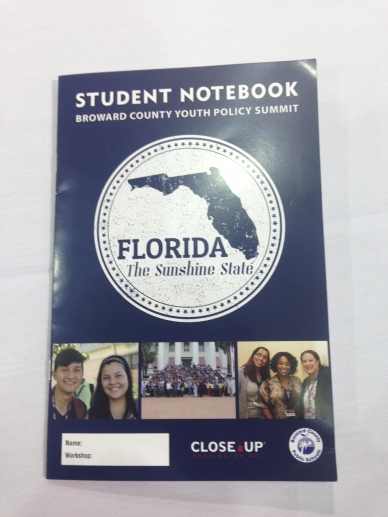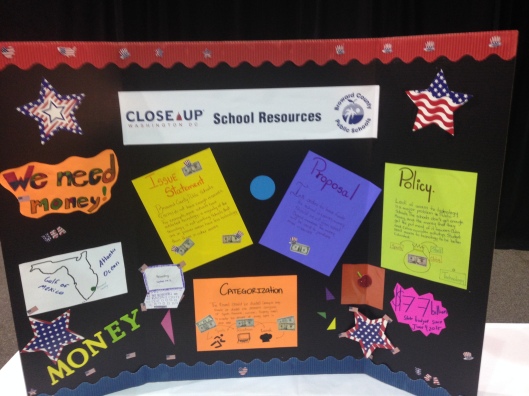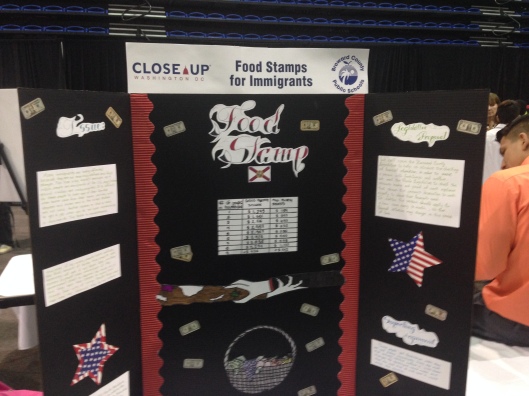Monthly Archives: November 2015
A Citizen Alternative to ISIS
A Citizen Alternative to ISIS
In the face of violent threats from groups like ISIS, a citizen-led alternative is crucial. Schools and colleges are a potential site. Thus my first idea.
Culture change involves conceptual change, put into practice in a different kind of politics, plural and citizen-centered, taking root in free public spaces around education. This means "relationships before program," in the language of community organizing. But such politics can take place many places beyond community organizations.
Put differently, I agree with Meier's call for "every community discussing what they want for themselves, their neighbors and the world." But the call needs to be connected to a different politics which can build public relationships across vast differences, conveying a vision of a democratic way of life based on diversity and agency. Otherwise, "discussing what we want" easily turns today into what we want for our kind of people.
We're living in a bitterly fragmented world. Value wars continually erupt around education. Education is one rare "commons" in which communities of different value frameworks are invested. Organizing for change in and around schools and colleges is key to "changing the world." But it's not a matter of rallying educational progressives around a program.
Kenan Malik observes last Saturday in "Why Do Islamist Groups Seem So Much More Sadistic, Even Evil?," in the Guardian that Islamist groups like ISIS include many young people who are not very different than other young people -- they're certainly not monsters from another planet. They're also hostile to progressive politics. They go to secular public schools. And they are hopeless about making democratic changes in their schools.
They have some similarities with young people who join gangs but Islamist youth identify with fundamentalist religion. They demonize "infidels" whom they see as a part of a secular, consumer, individualist, impersonal world. They rage against a culture that seems destructive of their identities and interests.
Many less extreme but nonetheless deep divisions produce Manichean politics, a totalizing politics of good versus evil. What is needed is a way for people to build relationships across chasms of faith, ideology, and other differences, a different kind of politics, as context for developing common agendas.
This requires "free spaces" where politics centers on citizens not on ideologies or parties. London Citizen, an affiliate of the Industrial Areas Foundation community organizing network, illustrates.
It is extremely diverse, with Muslims, Christians, and Jews, all of many persuasions, and also nonbelievers. It includes schools, unions, civic groups. London Citizen creates multiple free spaces where people build public relationships with people who make them uncomfortable or even dislike. This is their ground for developing programmatic ideas. Such politics creates hope, countering the fatalism which violence feeds on. Luke Bretherton's recent Resurrecting Democracy: Faith, Citizenship, and the Politics of a Common Life is a brilliant analysis.
This kind of politics can inspire electoral politics -- in England it's produced a "Blue Labour" alternative to conservative politics and to the technocratic centrism of Tony Blair alike, with affinities with Catholic social thought and its emphasis on decentralization of power. But London Citizen itself continues as a highly diverse, cross-partisan site of citizen-centered politics.
The emerging field called "Civic Studies" seeks to conceptualize such politics. Civic Studies, also called "The New Civic Politics," is organized around core concepts of agency and citizens as co-creators. The Tisch College of Citizenship at Tufts University has a lot on Civic Studies, including a book describing its feeder intellectual traditions, and a curriculum of the Summer Institute of Civic Studies each year. The Tisch College has a site.
The late Elinor Ostrom, who won the Nobel Prize in Economics in 2009, and I worked on a chart comparing citizen-centered politics with government-centered ideological politics and community-centered politics. I put a version about education up on academia. .
We need to spread such citizen-centered politics -- as a way to create a democratic movement around schools, and as the alternative to deepening chaos and violence.
The Welcome Project
I am deeply honored to have been elected last week as Vice Chair of The Welcome Project, a Somerville non-profit I have worked with for many years.
I join board chair César Urrunaga, treasurer Tim Groves, clerk Judith Perlstein as well as interim executive director Ben Echevarria and a great group of board members in serving as a steward for this this important organization.
The Welcome Project builds the collective power of Somerville immigrants to participate in and shape community decisions.
That is, The Welcome Project is an inherently civic organization: it does not seek to assimilate immigrants into a pre-existing culture, but rather seeks to equip area immigrants with the tools to effectively add their voices and perspectives to the ongoing task of improving our community.
This is an important distinction.
Somerville is a city of immigrants, as, indeed, the United States is a nation of immigrants. Our community’s personality, our strength, comes not from excluding those who are different from us nor from forcing others to conform to some socially-constructed norm.
The Welcome Project celebrates immigrants for who they are and for what they bring to the community.
This can often take practical forms – The Welcome Project is known partly for its ESOL adult language classes. But importantly, it takes an active form: in the classroom, English language skills are taught through a focus on student-selected topic areas.
Right now, most students are learning about jobs and housing. Other students are learning about mental health issues – particularly issues like culture shock, which hold particular interest in immigrant communities. These are the issues which effect our students most deeply. These are the issues for which our students voices need to be heard.
Our work is not just a service to the students who learn with us; its a service to the community. We need all these voices. We need all these perspectives.
I am thrilled to have been named Vice Chair of this great organization, and I look forward to continuing to support its growth in the coming years.
Ginwright on Blacklivesmatter
Shawn Ginwright is one of the best analysts of the #Blacklivesmatter movement. These are excerpts from his article “Radically Healing Black Lives: A Love Note to Justice“* that help explain what is happening in America today.
First, a great statement of why the movement emphasizes Blacknesss and yet is for all:
A love ethic is an unconditional desire for human dignity, meaningful existence, and hope. #Blacklivesmatter is a movement of dignity, meaning, and hope in a critical moment when race in general, and Blackness in particular, has become a third rail, and avoided in policy debates. The statement “Black lives matter” also gives others permission to practice courageous love and to celebrate and protect the dignity and humanity of all people.
And here is Ginwright on the double agenda–changing systems and healing people:
Healing justice is an emerging movement that seeks both (a) collective healing and well-being, and also (b) transforming the institutions and relationships that are causing the harm in the first place (Wallace, 2012). …
Young community leaders increasingly acknowledge that both organizing and healing together are required for lasting community change. Both strategies, braided together, make a more complete and durable fabric in our efforts to transform oppression, and hold the power to restore a more humane, and redemptive process toward community change. …
[By analogy,] environmental justice activists view policies that promote pollution and fossil fuels as harmful to the earth and our environment. Much of their activism focuses on protecting the environment from harm created by lack of awareness or concern for the natural environment. Similarly, healing justice activists view policies that promote violence, stress, hopelessness in schools and communities, as harmful to our collective well-being, human dignity, and hope. Rather than viewing well-being as an individual act of self-care, healing justice advocates view the practice of healing as political action.
*from New Directions for Student Leadership, no. 148 (2015), pp. 33-44.
A Citizen Alternative to ISIS
A Citizen Alternative to ISIS
A Citizen Alternative to ISIS
4th Int’l Conference on PB in N. America Opens Call for Proposals
Before you check out for the holiday this week, we encourage our members to consider responding to the call for proposals for the 4th International Conference on Participatory Budgeting in North America, which will be hosted in Boston, MA from May 20th – 22nd, 2016 by the Participatory Budgeting Project, one of our great NCDD member organizations.
 The deadline to submit for the conference is December 18th, 2015, so don’t wait too long! You can read the full call for proposals here.
The deadline to submit for the conference is December 18th, 2015, so don’t wait too long! You can read the full call for proposals here.
This year’s conference will coincide with the voting phase of the Boston’s youth participatory budgeting process, which adds an exciting focus on young people’s participation in deliberative processes to the gathering. Here is how PBP describes the conference:
The 4th International Conference on Participatory Budgeting in North America, organized by the Participatory Budgeting Project (PBP), will take place in Boston, Massachusetts, USA during the voting phase of their award-winning, city-wide, youth PB process.
The conference is a space for participants and organizers of PB processes to share and reflect on their experiences so far, alongside interested activists, practitioners, scholars, elected officials, and civic designers.
The PB Conference will be organized around three themes this year:
2016 Conference Themes
- Youth power through PB: PB in schools, youth-only processes, and nearly every other PB process in North America uniquely gives real power to young people – as young as 11! What can we do to encourage even more youth leadership with PB?
- PB in practice: What is working well? What has been less successful? What improvements can be made in the way the process is implemented? How can we do better and be more effective with existing PB processes and how can we put more processes in place across North America and around the world.
- Measuring impact: How do we define a good PB process? What are the best ways to define success in this context? What are innovative, effective tools and methods we can use to assess the impact of processes that are currently underway as well as to shape new PB processes.
Any proposals for workshops, presentations, panel discussions or other creative formats focused on one of these three themes will be welcomed for consideration, and you can send in proposals via the submission form at www.pbconference.org/submit. For more information, email PBP at conference@participatorybudgeting.org.
Again, the deadline for submissions is December 18th, so send in your proposals soon! Registration for the conference is slated to open in January, and early registration will end in April. We can’t wait to see how this great gathering turns out!
For more information on the 2016 PB Conference, you can visit www.pbconference.org.
Making a Difference: Friday’s Close Up Broward Youth Policy Summit Expo
As you will recall from my last post, I was headed down to Broward County to see the great work being done there by the ESOL department within the district and by the Close Up Foundation. I am happy to say that it was a wonderful experience to see so many young immigrants dedicated to improving their communities and learning what it means to be a citizen. These 200 young people, almost all of whom have been in this country for three years or less, presented their civic-oriented proposals for feedback and discussion with local citizens, community leaders, and other interested parties. An overview of the expo can be seen below.
 What do I like about this? Where to start! It gives young people, new to this country a chance to engage in the process of civic life and civic work. It gets them thinking not only about problems, but about solutions. It develops their communication skills and their ability to talk with leaders and community members, such as district superintendent Robert Runcie, who can make a difference in their lives. No, let me revise that. It allows these kids to have a sense that THEY are making a difference THEMSELVES. Isn’t that what we want for our young people? That sense of belonging, of advocacy, and of efficacy as citizens?
What do I like about this? Where to start! It gives young people, new to this country a chance to engage in the process of civic life and civic work. It gets them thinking not only about problems, but about solutions. It develops their communication skills and their ability to talk with leaders and community members, such as district superintendent Robert Runcie, who can make a difference in their lives. No, let me revise that. It allows these kids to have a sense that THEY are making a difference THEMSELVES. Isn’t that what we want for our young people? That sense of belonging, of advocacy, and of efficacy as citizens?
I had the great pleasure of talking with many of these kids about their proposals, and it was incredibly refreshing to hear them articulate a passion for change and a desire to make a difference as residents and, yes, as citizens. They addressed issues of concern to both them and their community, were open to feedback and suggestions to strengthen their proposals, and demonstrated an understanding of the difference they could make, and why this effort mattered. It was wonderful to see. In the rest of this post, you can take a look at just a few of the dozens of proposals that these young immigrants shared.

It doesn’t have to be 15 dollars an hour to make a difference and help both business and the community!
These are just a few of the many different policy proposals that these wonderful kids came up with. Others involved protection of the environment, changing the role of the school counselor away from a testing coordinator to actual counselling, medical marijuana, school bullying, teen pregnancy, and so many more areas of relevance and concern in the immigrant community, in Broward, in Florida, and in the nation. Kudos to both Broward ESOL and the Close Up Foundation in this work. You can find additional images on the Expo at the Broward ESOL Facebook page, as well as through the Close Up Foundation’s Twitter feed (and they worth a follow!). I am excited to see what comes next, and I hope that we here at the Florida Joint Center for Citizenship might find ways to help in this effort down the road. So much promise!







